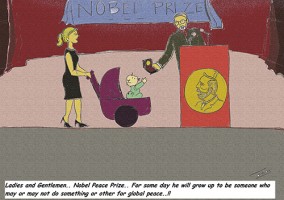Nelson Mandela, Aung San Suu Kyi, Mother Teresa and Martin Luther King Jr. have one thing in common: They’re all recipients of the Nobel Peace Prize.
Nobel what prize?
Nelson Mandela, Aung San Suu Kyi, Mother Teresa and Martin Luther King Jr. have one thing in common: They’re all recipients of the Nobel Peace Prize.
Among the accomplishments of just those four, the prize committee cites “the peaceful termination of the apartheid regime,” the “nonviolent struggle for democracy and human rights,” “a lifetime devoted to the destitute” and “the spearheading of the civil rights movement of a nation.”
If it were possible to invite to a dinner party every recipient since the prize’s 1901 inception, the number of inspiring, selfless, self-sacrificing and world-changing stories they could tell would take hours, if not days.
Which is why this year’s award announcement hit the floor with a heavy thunk, leaving many people asking, “huh?”
The 2012 Nobel Peace Prize went to the European Union.
Many hoped that the 2009 embarrassment of presenting President Barack Obama with the prize—for what he was hopefully going to do—was a one-off debacle, but then came this year’s announcement. With it, the question “Could it get any worse?” was answered with an emphatic “Yes!”
In what universe is the EU—a group of countries using the same currency—placed in the company of Holocaust survivor and author Elie Wiesel, who, in the words of the Nobel Committee, “is a messenger to mankind…one of the most important spiritual leaders and guides in an age when violence, repression and
racism continue to characterize the world”?
If there were already fears that the prize was regressing into irrelevance, this latest news only heightens them.
It’s not like other groups haven’t received it in the past, but when you look at which ones, you see Amnesty International, International Physicians for the Prevention of Nuclear War or the Red Cross.
Those make sense. The promotion of peace is the very reason they exist.
What exactly did the EU do that was so remarkable? The official statement was: “The union and its forerunners have for over six decades contributed to the advancement of peace and reconciliation, democracy and human rights in Europe.”
If that sounds a bit vague, it’s because it is.
The committee’s press release describes how “the EU represents ‘fraternity between nations’ and amounts to a form of ‘peace congresses’…[which are] criteria for the Peace Prize.”
Essentially, it’s arguing that because a nation’s membership in the EU is contingent upon a commitment to democratic government, the union’s mere existence has led to the spread of democracy and progress since World War II.
Nations behaving and getting along is fantastic, but isn’t that what they’re supposed to do? Aren’t all countries expected to seek “fraternity”?
The fact that we’re singling out the EU for this behavior is a bit odd. European countries that have chosen not to join the union, such as Norway, the birthplace of the prize, are excluded from this honor.
The prize seems to celebrate the idea of the EU more than any extraordinary contribution it’s made to the furtherance of peace.
Political commentator Ian Dunt observes that “The prize reflects how profoundly cut off from reality European supporters have become. It’s quite something to watch news footage of riots in Athens this week and conclude this project is promoting peace. The idea the EU is all that stands between us replaying World War II is deeply foolish.”
The fact that Europe has pursued peace since the era of Hitler and Nazi Germany is undoubtedly progress, but what was the alternative? The obliteration of the German economy in the wake of the war left the country little choice but to play nice. The motivation for this was not so much peace as it was its existence and ability to thrive within the capitalist system it was forced to join.
Awarding the prize to the EU as it attempts to eke its way through an embattled and limping economy looks suspiciously like encouragement rather than recognition.
As the capitalist world holds its breath and trains its collective eye on the EU’s navigation through the recession, the prize represents every other government’s hope for its success, not so much its pursuit of world peace.
We all wish the EU luck. But giving it a trophy for promoting peace is like giving one to Donald Trump for contributing to the integrity of U.S. politics.
And I’ll leave you with that.





